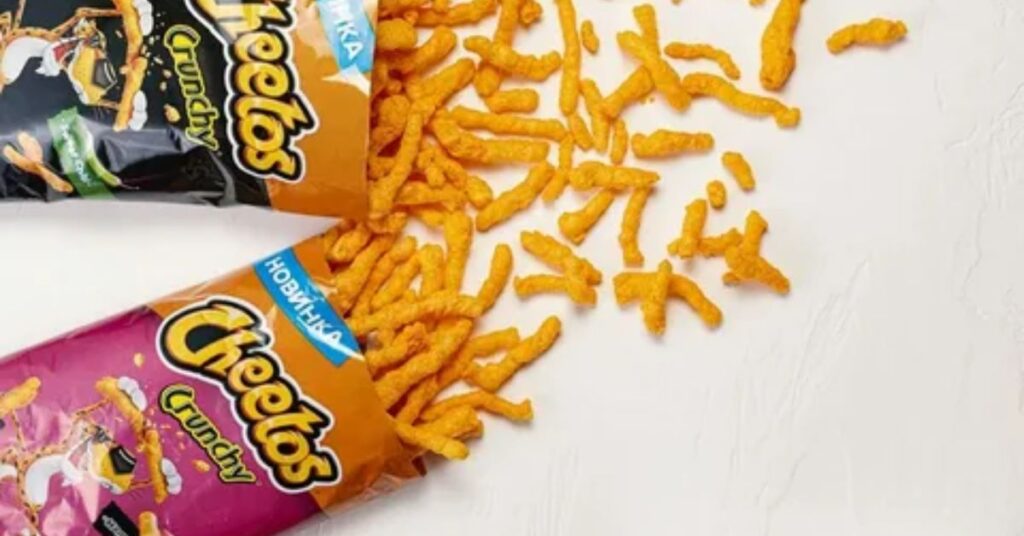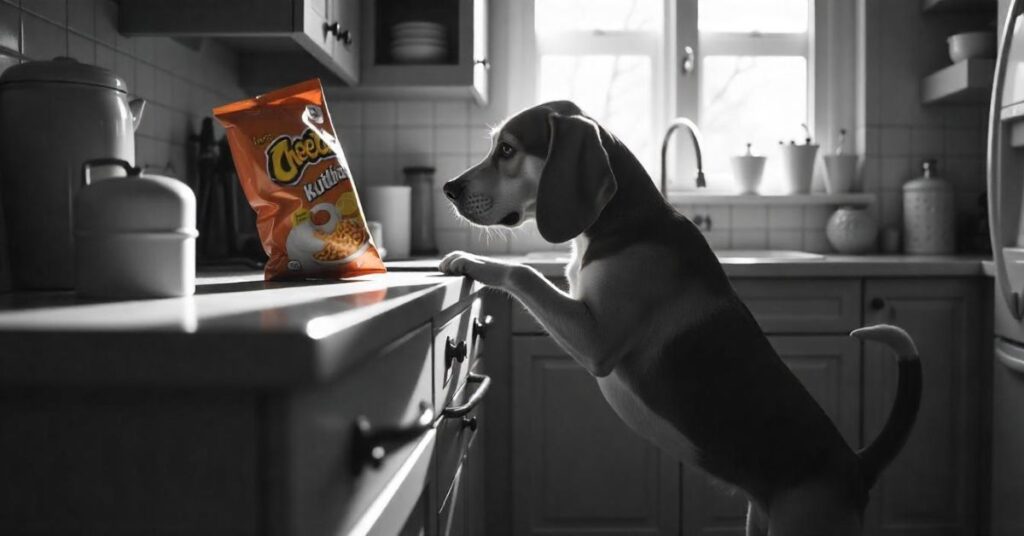Cheetos, the crunchy, cheesy snack we all love, often catches the curiosity of our dogs. But can dogs eat Cheetos safely, or is it a snack best left to humans?
In this article, you’ll learn why Cheetos aren’t the healthiest choice for dogs and explore safer treat alternatives. You’ll get practical tips and answers to common concerns, so you can make informed decisions for your dog’s health.
Can Dogs Eat Cheetos?
While a small bite likely won’t harm your dog, Cheetos are not a healthy choice. These cheesy snacks are loaded with salt, fat, and artificial flavors that don’t benefit your dog’s health. Dogs enjoy the crunch, but it’s best to offer safer treats designed just for them.
Cheetos contain ingredients like cheese powder and preservatives, which may cause digestive issues in dogs. Dogs lack the enzymes needed to digest processed additives effectively, which means Cheetos may lead to stomach upset or discomfort.
- Cheetos aren’t toxic but lack any health benefits for dogs.
- High salt in Cheetos can cause dehydration in dogs.
- Dogs struggle to digest cheese powder and preservatives in Cheetos.
- Hot Cheetos contain spices that may irritate a dog’s stomach.
- Eating Hot Cheetos could lead to vomiting or discomfort.
- Dogs do not gain nutrients from processed snacks like Cheetos.
- Offer healthy alternatives like carrots or apple slices instead.
- Avoid processed treats to keep your dog safe and healthy.
Spicy seasonings can irritate a dog’s digestive tract, causing symptoms like vomiting or diarrhea. While humans might love that extra kick, it’s best not to share spicy snacks with your pet.
If you want to treat your dog, try healthier options like carrots, apple slices, or even plain popcorn. These snacks offer nutrients and are far easier for dogs to digest. Keeping your pet’s diet safe and nutritious is always the best choice for long-term health.
Why Are Cheetos Not Recommended for Dogs?

Cheetos may look tempting, but they pose several health risks for dogs. Their high salt content can lead to dehydration and digestive issues, while artificial flavors may upset sensitive stomachs. Additionally, the crunchy texture creates a choking hazard, especially for smaller breeds.
Beyond the immediate dangers, Cheetos offer no nutritional benefits. Dogs require a balanced diet rich in proteins and essential vitamins, which these snacks lack. For your dog’s health, it’s best to avoid giving them Cheetos altogether.
Health Risks of High Sodium
Cheetos are loaded with sodium, which can be detrimental to your dog’s health. High sodium levels can lead to serious conditions like sodium ion poisoning. Symptoms may include vomiting, excessive thirst, and lethargy, making it crucial to keep these snacks away from pets.
Nutritional Deficiencies
It’s important to consider their nutritional value. These snacks primarily consist of processed corn and unhealthy fats, providing no real benefits for dogs. A diet lacking essential nutrients can lead to various health problems over time.
Allergies and Sensitivities
Some dogs may have allergic reactions to ingredients found in Cheetos. These reactions can manifest as skin irritations or digestive issues, making it essential to be cautious. Always observe your dog for signs of discomfort after introducing new snacks.
Weight Management Issues
Feeding dogs Cheetos can contribute to unhealthy weight gain. These snacks are high in calories and low in nutritional value, which may lead to obesity. Maintaining a healthy weight is vital for your dog’s overall well-being, so opt for better treats.
Choking Hazards
The crunchy texture of Cheetos can pose a choking hazard for dogs. Smaller breeds are particularly at risk of airway obstruction when consuming these snacks. To ensure safety, choose softer, dog-friendly treats that won’t create such dangers.
Better Snack Alternatives
Instead of Cheetos, consider offering healthier options like baby carrots or specially formulated dog treats. These alternatives provide flavor without the health risks associated with junk food. Always select treats that support your dog’s dietary needs and health.
Potential Health Issues for Dogs from Eating Cheetos

Cheetos can lead to several health issues for dogs, primarily due to their high sodium content. Excessive salt can cause dehydration and may result in symptoms like vomiting and lethargy. Moreover, the artificial ingredients and preservatives in these snacks can upset a dog’s digestive system.
In addition to sodium concerns, Cheetos lack essential nutrients that dogs need for a balanced diet. Feeding your dog these snacks can contribute to weight gain and nutritional deficiencies. Overall, it’s wise to avoid Cheetos for your furry friend to prevent potential health problems.
| Health Issue | Description |
| High Sodium Levels | Can lead to dehydration and sodium ion poisoning. |
| Digestive Upset | Artificial flavors may cause gastrointestinal distress. |
| Choking Hazard | Crunchy texture poses a risk for smaller breeds. |
| Allergic Reactions | Some dogs may have allergies to Cheetos ingredients. |
| Weight Gain | High calorie count contributes to obesity. |
| Nutritional Deficiency | Lack of essential nutrients in Cheetos. |
| Increased Thirst | High salt can lead to excessive drinking. |
| Behavioral Changes | Discomfort may lead to lethargy or irritability. |
Health Risks of Sodium
Dogs are much more sensitive to salt than humans, making excessive intake dangerous. Sodium ion poisoning can lead to serious health complications and requires immediate veterinary attention.
Digestive Problems
The artificial flavors and preservatives found in Cheetos can upset your dog’s stomach. Many dogs have sensitive digestive systems that react poorly to such additives. Observing your pet after trying new foods is essential to catch any potential issues early.
Choking Hazards
Cheetos’ crunchy texture poses a significant choking risk, especially for smaller dogs. Many pet owners underestimate this danger, thinking a snack is harmless. Always prioritize your dog’s safety by avoiding snacks that could obstruct their airway.
Allergic Reactions
Some dogs might experience allergic reactions to ingredients in Cheetos. These reactions can manifest as skin irritations, itching, or gastrointestinal upset. If you suspect an allergy, consult your veterinarian for guidance on dietary choices.
Weight Management Concerns
Feeding Cheetos can contribute to unhealthy weight gain in dogs. These snacks are calorie-dense and lack the nutrients dogs need to thrive. Maintaining a healthy weight is essential for your dog’s longevity and quality of life.
Nutritional Deficiencies
Cheetos provide no real nutritional value, leaving dogs without essential vitamins and minerals. A diet lacking in these nutrients can lead to various health issues over time. Instead of Cheetos, opt for treats that support your dog’s overall health and well-being.
What to Do If a Dog Consumes Cheetos Accidentally

If your dog accidentally eats Cheetos, the first step is to monitor their behavior. Look for signs of distress, such as vomiting, diarrhea, or excessive thirst. While a small amount may not cause immediate harm, it’s essential to stay vigilant.
Assess the Situation
- Check how many Cheetos your dog consumed.
- Smaller amounts might lead to mild discomfort but less severe consequences.
- If they ate a large quantity, prepare to take action quickly.
Next, contact your veterinarian for advice based on your dog’s size and health history. They may suggest monitoring your pet at home or bringing them in for an examination. It’s always better to be safe, especially if you’re unsure about potential reactions.
Seek Veterinary Advice
- Consulting your vet ensures you receive professional guidance.
- They can provide tailored advice based on your dog’s specific needs.
- Prompt action can prevent more severe health issues from developing.
Finally, keep an eye on your dog for any unusual symptoms over the next few hours. If they display persistent vomiting, lethargy, or unusual behavior, seek immediate veterinary care.
Monitor for Symptoms
- Look out for signs like lethargy, vomiting, or changes in appetite.
- Document any symptoms to share with your vet.
- Quick action can mitigate potential health risks associated with Cheetos.
By staying vigilant and acting promptly, you can help ensure your dog remains safe after consuming Cheetos. Always remember that prevention is the best approach; keep snacks like these out of reach to avoid future mishaps.
Alternatives to Cheetos for Dogs
When considering snacks for your dog, it’s important to choose healthier alternatives to Cheetos. Many dog-friendly treats provide essential nutrients and are safe for your furry friend. Options like carrots, sweet potatoes, and commercially available dog treats can satisfy their cravings without the risks associated with junk food.
Healthy Snack Alternatives
| Snack Alternative | Benefits | Preparation |
| Baby Carrots | Low in calories and high in fiber | Wash and serve raw |
| Sweet Potatoes | Rich in vitamins A and C, good for digestion | Cook and cut into bite-sized pieces |
| Green Beans | Low-calorie, great for weight management | Steam or serve raw |
| Apple Slices | Good source of vitamins and antioxidants | Core and slice thinly |
| Pumpkin Puree | Excellent for digestive health | Serve canned (unsweetened) |
| Blueberries | Packed with antioxidants and low in calories | Serve fresh |
| Plain Popcorn | Low in calories, fun texture | Air-popped, no salt or butter |
| Commercial Dog Treats | Formulated for canine health | Follow package instructions |
These alternatives offer both nutrition and enjoyment, allowing you to treat your dog without the drawbacks of Cheetos.
By prioritizing nutritious snacks over junk food like Cheetos, you can promote your dog’s overall health and well-being. Opting for fresh fruits and vegetables, or high-quality commercial treats, supports their dietary requirements. Remember, choosing the right snacks makes a significant difference in your dog’s happiness and health.
FAQs
Can Dogs Eat Cheetos?
No, dogs cannot eat Cheetos. They contain high levels of salt and artificial ingredients that can harm your dog’s health.
Can Dogs Eat Hot Cheetos?
No, dogs should not eat Hot Cheetos. The spices and heat can irritate their stomach and cause discomfort.
Are Cheetos Safe for Dogs?
Cheetos are not safe for dogs. These snacks offer no nutritional value and can lead to digestive upset.
What Should I Do If My Dog Eats Cheetos?
If your dog eats Cheetos, monitor them closely. Contact your vet if they show signs of vomiting or lethargy.
Can Dogs Have Cheese Puffs Instead?
No, cheese puffs are also unsafe for dogs. They contain similar unhealthy ingredients and should be avoided.
Conclusion
Cheetos pose health risks due to their high salt and unhealthy additives. They do not provide any nutritional benefits that dogs need. Instead of giving your dog Cheetos, choose healthier snack options. Fresh fruits and veggies or specialized dog treats are much better choices. Always prioritize your dog’s health and well-being by avoiding junk food. Keeping snacks out of reach will help prevent accidents.
Also Read:
- How Much Does a Labradoodle Shed? 10 Grooming Tips
- Border Collie breed insights: care, personality, and expert health tips

Emerson is an expert in the world of pets, specializing in understanding diverse breeds, nutrition, and health. His deep knowledge ensures your pets receive the best care, from balanced diets to top-notch health advice, keeping them at their happiest and healthiest.











